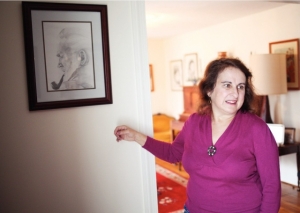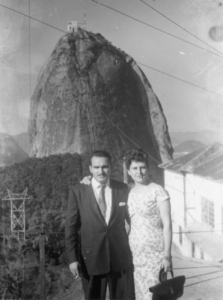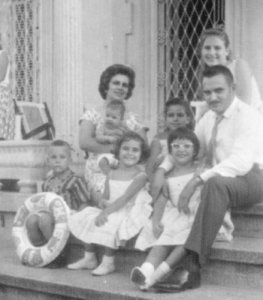Fleeing Cuba: Local woman recalls Castro's rise
By Phyllis Moore
Published in News on December 4, 2016 1:45 AM

News-Argus/SETH COMBS
Fe Finch, next to a portrait in her Pikeville dining room of her late father, Dr. Jose deVarona, former director of O'Berry Center, who had been appointed minister of public health when Fidel Castro came into power in Cuba. As the political climate changed, deVarona and his wife fled the country, first sending five of their six children over to the U.S.

Submitted photo
When Fe Finch learned of the passing of Fidel Castro, she spent most of the day crying.
But not because he died.
Memories of her early life in Cuba -- where her father and uncle had both been appointed by Castro as minister of public health and secretary of labor, respectively, only to later resign from the communist regime and wind up on in dire circumstances that included being on a "list" and ultimately fleeing from their homeland -- flooded over her.
"We were some of the Peter Pan group of kids," she said. "We were sent over (to the U.S.) before my parents came. There were five of us.
"There are six of us but the baby was too little to send. So the five oldest were sent over with the Peter Pan (flights). It was July 24 or 25, 1961."
She was 6 years old at the time, the fourth in the lineup, when she boarded the plane bound for Miami.
"Operation Peter Pan" was a mass exodus of over 14,000 unaccompanied Cuban minors to the United States between 1960 and 1962, when Castro took over the presidency.
"I remember enough of Cuba since I was 6," she says now. "I remember bits and pieces here and there. I do remember my home.
"I remember the curfews that were sounded and the sirens at night, and we'd have to come in."
It was also a prosperous time, she said.
"People didn't go hungry in Cuba," she said. "In the 1950s Cuba's economy was very strong. The Cuban dollar, peso, and the American dollar were equal in value on the streets. You could buy something either with a peso or a dollar.
"But the problem was that (Fulgencio) Batista had taken over as a dictatorship and he had not been elected and the people weren't happy about this. He had run for election and in the past been elected president."
When he lost a subsequent run for the office, he forcibly took over.
Castro promised a democracy, duping his supporters until he got into power, she said, prompting the disruption and division that remains today.
"My uncle, Manuel Fernandez, was the secretary of labor. You'll find him in the history books," Mrs. Finch said. "My father, Jose deVarona, is going to be a little harder to find because he was something akin to the attorney general. He wasn't an elected position. He was an appointed position."
Both of her parents were physicians, she said, but had grown up in farm families. She recalls them being "very upset" by the changing political climate.
"They were really unhappy," she said, explaining that many actually picked up guns and fought against the oppressive regime. "Once Castro came into power, I think it was 96 percent of Cuba was in support of Castro. They thought it was going to get better.
"What happened was Castro declared that he was and always had been a Marxist-Leninist."
Things rapidly changed, she said, as the leader began doing what he called "interventions."
"He told my father that he needed to teach the sanitation workers to indoctrinate into communism," she said. "He (my father) refused. He stepped down from his position.
"They wanted him to work at the university, but he chose to work at the hospital because they would have less control over him."
Her parents supported efforts like running food and radio equipment to the mountains, as well as keeping papers for the revolution, she said.
There were some close calls along the way, she said, recalling an instance where they were to meet with a contact. When he didn't show and they were unable to find him, she said, they received a warning to get out quickly.
"Two or three weeks later they found someone had killed (the contact)," she said.
Her uncle was accused of being a conspirator, seeking asylum at the embassy, where he stayed, "months and months, maybe a couple years," she said.
"My father went into hiding, too, because he had also resigned. My uncle and my father did not conspire against Castro," she said, adding, "I have another uncle who actually did conspire, actually did sabotage."
Exiting the country was tricky, she said.
"(My father) had to sneak out because at the time he was on the list of people to watch," she said. "He went under another name. He left as quickly as he could. Castro was still letting people out, but he had already started targeting specific people because he was losing all his professionals."
Dr. DeVarona and his wife, Dr. Angela Ruiz deVarona, along with their youngest child, and two other relatives, narrowly missed being detained, she said.
"When my father was at the airport, he had to stay hidden," she said, explaining that there was a medical checkpoint there. "The doctor who examined my father recognized him but didn't say anything.
"My father was well respected. So he was able to leave. But he left with my mother -- all they had in their suitcases were photos."
Mrs. Finch, now 61, has vivid recollections of being uprooted from her parents and coming to America, where she and her siblings wound up in Albuquerque, New Mexico.
"Nobody could take all five of us," she said. "There were two Catholic families, a Polish family that had fled Poland in the early 1950s under the same circumstances, escaping communism, and the Griffins, who were third- or fourth-generation Americans coming from probably Ireland or someplace like that."
"These families were wonderful families, and they made lots of efforts for us to see each other as often as possible."
As the fourth in line, "the oldest of the three youngest," Mrs. Finch said her family was more fortunate than most. They only spent six months with their host families.
"There were families whose children, their parents never made it out of Cuba," she said. "We knew of a family, their parents didn't come until 10 years later."
It was admittedly a challenge for the then-6-year-old, she says now.
"I had been spoiled because I almost died as a baby," she said. "I got to the U.S., and I had come from a tropical green country to the desert (of Albuquerque).
"I had picked up some English, but I refused to say a word in English. This was my way of fighting back for what I was upset about -- they had taken my brother away, they had taken my mother and father away."
Once the family was reunited, they moved to Virginia before settling in Pikeville. Both parents worked at Cherry Hospital for awhile, her father later becoming director at O'Berry.
They never returned to Cuba, she said, her parents because they "couldn't" and her siblings for other reasons. She said she would like to go there one day, but anticipates there will be mixed emotions.
Her father died in 2010, her mother three years later.
They would not live to see the passing of the Cuban dictator, she said, although Fidel's brother, Raul, still remains in power.
Her parents' stories still remain a large part of the fabric of the family, she said. Now retired from Wayne Community College, she and her husband, Warren Finch, of Pikeville, raised four children, who often interviewed their grandparents and wrote essays about them.
So when news of Fidel Castro's passing broke last weekend, amid the mixed reactions of celebrating and mourning, she reached for a bottle atop her china cabinet.
"There's a cider that they like in Spain," she said. "It's very nice, good cider, you traditionally drink at Christmas but not too much alcohol content. Somebody in Miami took off a label on these bottles, (and replaced it with) 'To be drunk only when Fidel dies.' My parents had a bottle of that."
Her three oldest siblings live in Winston-Salem, the three youngest in Wayne County -- older brother Jose DeVarona and the youngest, Bella Wise, the baby brought over when their parents came to the U.S. They live within five miles of each other.
"I told them, we're going to go by Mami and Papi's graves. We can't wait until Christmas," she said. "All the other Cubans are celebrating."
As sunset neared, Mrs. Finch and her husband, son and his wife, her sister and two grandchildren made their way to Pikeville Cemetery and placed Cuban and American flags on their parents' graves.
"We went, and I talked to Mami and Papi, told them what happened. We weren't celebrating their deaths but celebrating (my parents') lives," she said. "(The cider) was not drinkable, so we poured it over their graves.
"We'll do something with the whole family at Christmas. That day something needed to be done."
She shared a quote she heard in the aftermath of the dictator's passing that capsulized her sentiments, she said.
"'We're not celebrating the death of a man, we're celebrating the death of a dictator,'" she said.
In contrast to the "horrible things" that happened under Castro, she has great pride in the man she called "Papi."
"My father was a very hard-headed man but made a stand for his convictions," she said, praising his strength and courage. "I have heard story after story about my father standing up to other people for what he felt was the right thing to do. It was the right thing to do at the time.
"And my mother was supportive of my father all the way. She came from a different background. But she was very loving, one of the most genuine people I have ever met."

